Al-Qaeda magazine calls for Xinjiang to be ‘recovered by the Islamic Caliphate’
PUBLISHED : Tuesday, 21 October, 2014, 12:28pm
UPDATED : Tuesday, 21 October, 2014, 1:40pm
James Griffiths [email protected]
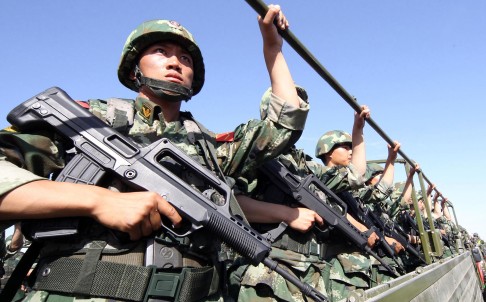
An anti-terrorism force including public security police and the armed police attend an anti-terrorism joint exercise in China's restive Xinjiang region. Photo: AFP
A new English-language magazine released by al-Qaeda describes China’s restive Xinjiang region as an “occupied Muslim land” to be “recovered [into] the shade of the Islamic Caliphate”.
Produced by the jihadist organisation’s As-Sahab media wing, the 117-page debut issue of Resurgence includes a feature titled “Did You Know? 10 Facts About East Turkistan,” referring to the name for Xinjiang used by those who advocate independence from China.
While much of the article is inaccurate – it claims, for example, that teaching the Quran is illegal in China (Islam is one of the country’s five recognised official religions) – it shows how China’s actions in the region, such as encouraging the migration of Han Chinese into Xinjiang and restricting religious dress, are being used by jihadist organisations to confirm their belief that Muslims are under threat.
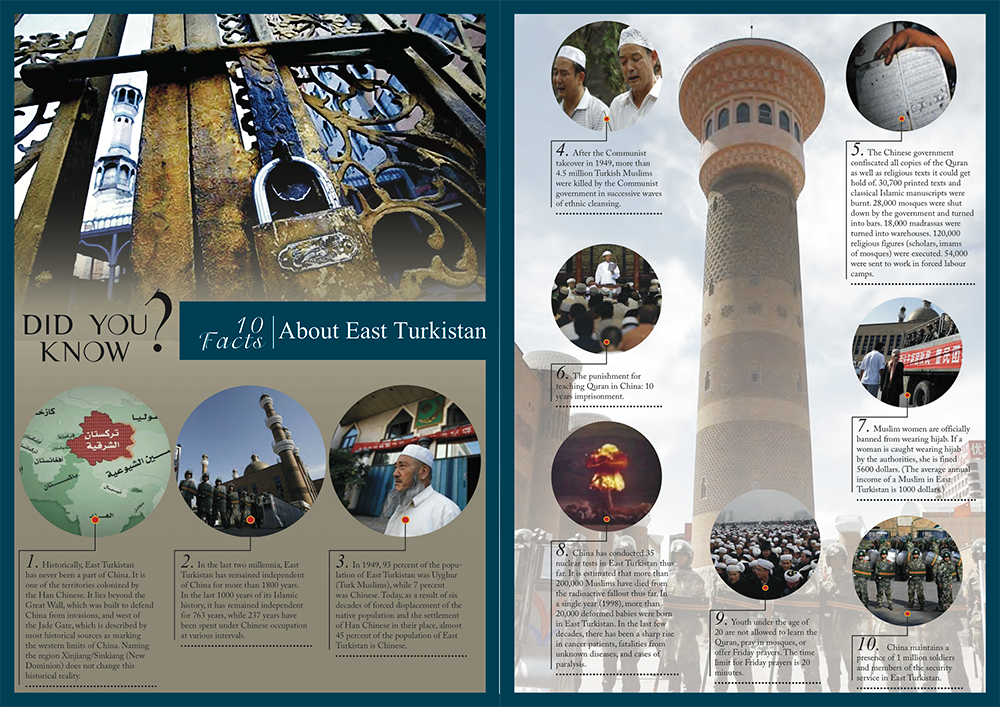
“Did You Know? 10 Facts About East Turkistan", in al-Qaeda's Resurgence magazine, claims that China carries out ethnic cleansing against Muslims.
Al-Qaeda is not the only jihadist organisation which has expressed an interest in the situation of Muslims in Xinjiang. In July, Abu Bakr al-Baghdadi, the self-styled caliph of the Islamic State, also known as ISIS or ISIL, spoke of Muslim rights being “forcibly seized” in China in a call for Muslims around the world to pledge allegiance to him.
“Your brothers all over the world are waiting for your rescue, and are anticipating your brigades,” Baghdadi told his followers.
“In recent years [jihadist organisations] have expressed an interest in the alleged oppression of Xinjiang Uygurs by the Han Chinese,” Ahmed Hashim, a terrorism expert and associate international studies professor at Singapore’s Nanyang Technological University, told the South China Morning Post. “China is being seen as an oppressive power as it grows in strength.”
“The contact between Uygur separatists and jihadists has been rather limited but is increasingly facilitated by Uzbek jihadists in recent years in remote regions of Pakistan,” he said.
China has long maintained that separatist groups in Xinjiang have links to foreign jihadist organisations. After the September 11 terrorist attacks on New York and Washington, Beijing lobbied for the East Turkestan Islamic Movement (ETIM) to be placed on the United States’ terrorist watch list.
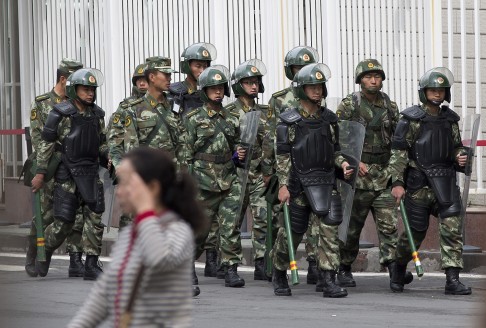
Paramilitary policemen with shields and batons patrol near the People's Square in Urumqi, Xinjiang region. Photo: AP
ETIM – which experts say is more of an umbrella term used by the Chinese government for a number of different groups, including the Turkestan Islamic Party (TIP), than an actual cohesive organisation – has been accused by Beijing of involvement in a number of terrorist incidents in recent years, including the Kunming Railway Station massacre in March which left 31 people dead and injured 141.
While leaders of TIP, believed to be based in Pakistan’s lawless tribal region, have voiced support and even claimed credit for some attacks in China, some have questioned the group’s ability to carry out terrorist plots thousands of kilometres away.
The influence of foreign jihadist organisations on events in Xinjiang has also been questioned. While al-Qaeda and Islamic State have begun using the situation there in their propaganda, experts argue that the roots of the unrest ultimately lie in China’s policies in the region.
“Identifying external ‘provocations’ remains important to the narrative about Uygurs perpetuated by the Chinese state,” Sean Roberts, director of international development studies at George Washington University’s Elliott School of International Affairs, told Vice News last month.
Beijing, Roberts argues, believes its policies are “gracious and generous to the Uygurs and immune to criticism. Thus, if Uygurs are resisting the Chinese state, it must be due to external forces seeking to destabilise what is harmonious and prosperous.”
“When the approach taken by the Chinese government is a total clampdown then people will go in more extreme directions, that’s a natural response and we’ve seen it in a number of other situations,” Raffaello Pantucci, a senior research fellow at the Royal United Services Institute focusing on counter-terrorism and radicalisation, told the Post.
“Historically though, extremist Uygur groups have never been able to get the global [jihadi] movement to do much more than talk about their problems,” he said. “There’s a lot of rhetoric but it doesn’t translate into action.”
“The Chinese government has a tendency to say that any incident that takes place in China is affiliated to a foreign group, but it rarely goes into the particulars of who is behind and directing these plots," Pantucci added.
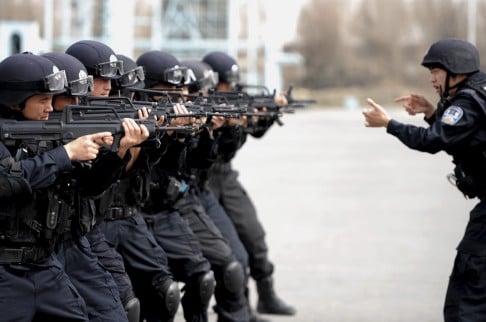
Policemen from the SWAT team practice during a drill in Urumqi, Xinjiang region. Photo: Reuters
“China’s ongoing security crackdown in Xinjiang has forced the most militant Uygur separatists into volatile neighbouring countries, such as Pakistan, where they are forging strategic alliances with, and even leading, jihadist factions affiliated with al-Qaeda and the Taliban,” wrote Philip Potter, an assistant professor of public policy and political science at the University of Michigan, in a paper published earlier this year.
The allure of jihadist organisations – particularly the Islamic State, which has proven itself adept at waging online propaganda and recruitment campaigns – is strong for disillusioned young people in countries all over the world.
The International Centre for the Study of Radicalisation at King’s College London estimates that around 74 nationalities are fighting under the black flag of the “Caliphate”, including more than 500 British militants.
In July, China’s former special envoy to the Middle East, Wu Sike, said that around 100 Chinese citizens are fighting with the Islamic State in Iraq and Syria.
In an article last month, the state-run Global Times quoted an unnamed “anti-terrorist worker” as saying that Xinjiang militants who joined the Islamic State “not only want to get training in terrorist techniques, but also to expand their connections in international terrorist organisations through actual combat to gain support for escalation of terrorist activities in China.”
Uygur exile groups complain that Beijing already exaggerates the threat posed by terrorism to justify harsh crackdowns in Xinjiang.
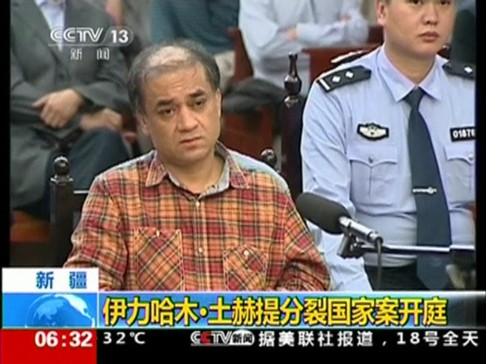
Uighur academic Ilham Tohti sits during his trial on separatism charges in Urumqi, Xinjiang region. Photo: CCTV
The concern for many observers is that as more and more moderate groups and intellectuals are silenced – such as Ilham Tohti, an economics professor and advocate for Uygur rights who was jailed for life by a Xinjiang court in September – foreign jihadist organisations, acting outside of China and more difficult to control and suppress, become the only option for those frustrated by Beijing’s policies.
In a recently released annual report by the US Congressional-Executive Commission on China – tasked to monitor human rights and legal developments in the country – the authors found that “overly broad security measures and crackdowns, restrictions on peaceful religious activists, and constraints on expressions of Uygur cultural identity have heightened tensions in [Xinjiang]”.
